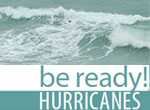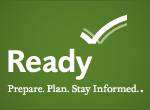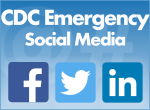Be Safe After a Hurricane

The storm might be over, but that doesn’t mean the danger is. Keep your loved ones safe after the storm by following our safety tips.
Stay Safe Indoors
Never use a wet electrical device
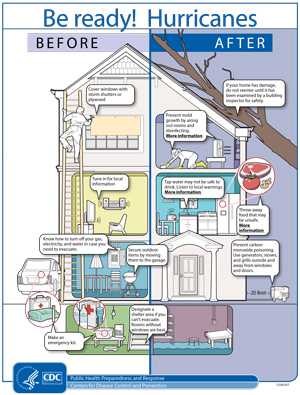
- If it’s still plugged in, turn off the power at the main breaker. Wait for an electrician to check the device before using it.
- Learn more about electrical safety after a disaster or emergency.
If the power is out, use flashlights instead of candles
- If you have to use candles, keep them away from anything that can catch fire. Always stay near lit candles.
- Learn more about hazards related to power outages.
Be careful near damaged buildings
- Keep in mind that hurricanes can damage buildings and make them unsafe. If your home or another building has been damaged, make sure it’s safe before going inside.
- Leave your home or another building right away if you hear shifting or unusual noises. Strange noises could mean it’s about to fall.
Prevent carbon monoxide poisoning
Gas or coal-burning equipment creates carbon monoxide. This can include equipment like generators, pressure washers, charcoal grills, and camp stoves. You can’t smell it or see it, but if carbon monoxide builds up in your home, it’s very dangerous. To keep your family safe:
- Never use gas or coal-burning equipment inside your home, basement, or garage. Keep it outside and at least 20 feet from any window, door, or vent.
- Use a battery-operated or battery backup CO detector any time you use a generator or anything else that burns fuel
- Never run a car or truck inside a garage attached to your home, even with the garage door open.
- Never heat your home with a gas oven.
- If you have a carbon monoxide detector and it starts beeping, leave your home right away and call 911.
- To be safe, learn the symptoms of carbon monoxide poisoning. If you think that carbon monoxide might have made you or a family member sick, go to a doctor or hospital right away.
- Check out Carbon Monoxide Poisoning After a Disaster for more information.
Stay Safe Outdoors
Keep away from floodwater
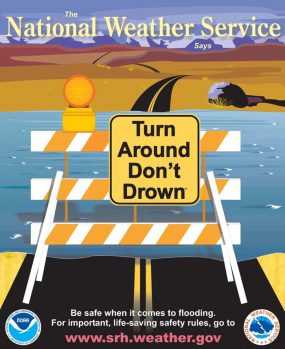
- Always follow warnings about flooded roads.
- Don’t drive through floodwater– it may be deeper than you think.
- If you have to be in or near floodwater, wear a life jacket — especially if the water is rising.
- Keep in mind that floodwater often carries germs. If you touch it, be sure to wash your hands with soap and water. If you don’t have soap or water, use alcohol-based wipes or sanitizer.
- Visit Flood Water After a Disaster or Emergency for more information.
Stay away from power lines and dangerous materials
- Stay clear of fallen power lines. Call the electric company to report them.
- Watch out for power lines overhead.
- Learn more on how to protect yourself from electrical hazards after a disaster.
Protect yourself from animals and pests
- Floods can bring mosquitoes that carry disease. Use insect repellent (bug spray) with DEET or Picaridin. Wear long sleeves, pants, and socks when you’re outside. Visit Mosquitos and Hurricanes for more information.
- Stay away from wild or stray animals after a storm. Call 911 or your public health department to report them.
- If you see a dead animal, report it to local officials.
- Read more about rabies, a disease sometimes spread by animal bites.
- Learn more on how to protect yourself from animals or pests after a disaster.
What’s next?
Check out Fact Sheet: Clean Up Safely After a Disaster for more information on cleaning up after a hurricane.
Learn more
- Page last reviewed: September 6, 2017
- Page last updated: October 2, 2017
- Content source:
- National Center for Environmental Health (NCEH); Agency for Toxic Substances and Disease Registry (ATSDR); Office of Noncommunicable Diseases, Injury, and Environmental Health (ONDIEH); National Center for Chronic Disease Prevention and Health Promotion (NCCDPHP); National Center for Birth Defects and Developmental Disabilities (NCBDDD)


 ShareCompartir
ShareCompartir
